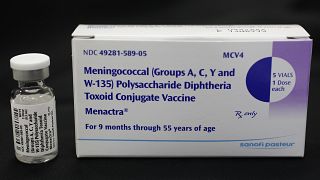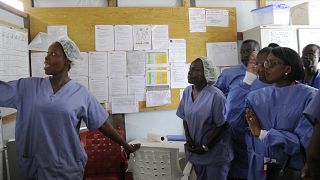Niger
Niger is currently facing a rapid increase in the number of meningitis cases compared to teh same period last year.
By mid-April, the country recorded 2012 cases with 123 deaths according to World health organization.
Last year, when 1,389 cases were recorded, with 72 deaths in the first 16 weeks of the year.
By the end the April 143 deaths were recorded.
Vaccination was launched in early May in Niamey to contain the spread of the disease.
Amina Boubacar came with her child to get the jab.
"People are talking about this disease everywhere in Niamey but not everyone has the means to pay to get vaccinated. So I think, this is very good initiative."
Just like Amina, many families were enticed by the fact that the vaccination is free of charge.
Most affected regions
The vaccine used is a new one and has the advantage of protecting targets against five strains which are the main causes of meningitis in Niger.
"We started with the schools on Thursday and Friday, then on Saturday and Sunday we moved into the neighbourhoods. The population is coming and we're doing it in a calm atmosphere, really, we haven't had any problems so far," nurse Abdou Mamou Siddo said.
The mobile unit teams say they have vaccinated 1,000 people in the city in 4 days. Unlike previous vaccines, the one used is a single dose.
READ ALSO: Meningitis outbreak kills students in northern Nigeria
The region of Niamey has recorded the highest number of cases so far this year with a cumulative incidence proportion of 52.2 cases per 100,000 inhabitants.
Niamey official Sahabi Assoumane said more health districts will be targeted.
"Given the epidemic threshold was reached in 3 health districts, the ministry of public health and social affairs filed a request to the International Coordinating Group (ICG) on Vaccine Provision to ask for operational support. To respond to the epidemic, a vaccination campaign will be conducted in all 5 health districts of the region."
Agadez, and Dosso are the most affected after Niamey.
Vaccination is for people aged 1 to 19.
What is meningitis?
It is a serious infection of the meninges, the membranes covering the brain and spinal cord. The disease can be caused by many different pathogens including bacteria, fungi or viruses, but the highest global burden is seen with bacterial meningitis, accordig to teh WHO.
Several different bacteria can cause meningitis. Streptococcus pneumoniae, Haemophilus influenzae, Neisseria meningitidis are the most frequent ones. N. meningitidis, causing meningococcal meningitis, is the one with the potential to produce large epidemics. There are 12 serogroups of N. meningitidis that have been identified, 6 of which (A, B, C, W, X and Y) can cause epidemics.
Who are mainly affected?
Meningococcal meningitis can affect anyone regardless of age but mainly affects babies, preschool children and young people.
How is it transmitted?
The bacteria that cause meningitis are transmitted from person-to-person through droplets of respiratory or throat secretions from carriers. Close and prolonged contact – such as kissing, sneezing or coughing on someone, or living in close quarters with an infected person, facilitates the spread of the disease. The average incubation period is 4 days but can range between 2 and 10 days.
Niger is located in what is called the "African meningitis belt". The Sahelian country is one of the 26 ‘hyperendemic’ African countries for meningitis.













Go to video
Mystery disease in Congo might be malaria - Authorities
Go to video
Malaria cases surge in 2023, says WHO Report
01:01
Mystery disease spreads in DRC, mainly affecting children and the malnourished
01:34
Congo on alert over mystery flu-like disease as death toll rises
Go to video
Mystery disease kills 143 in southwest Congo
01:54
Kenya approves roll out of vaginal ring to protect women against HIV infections